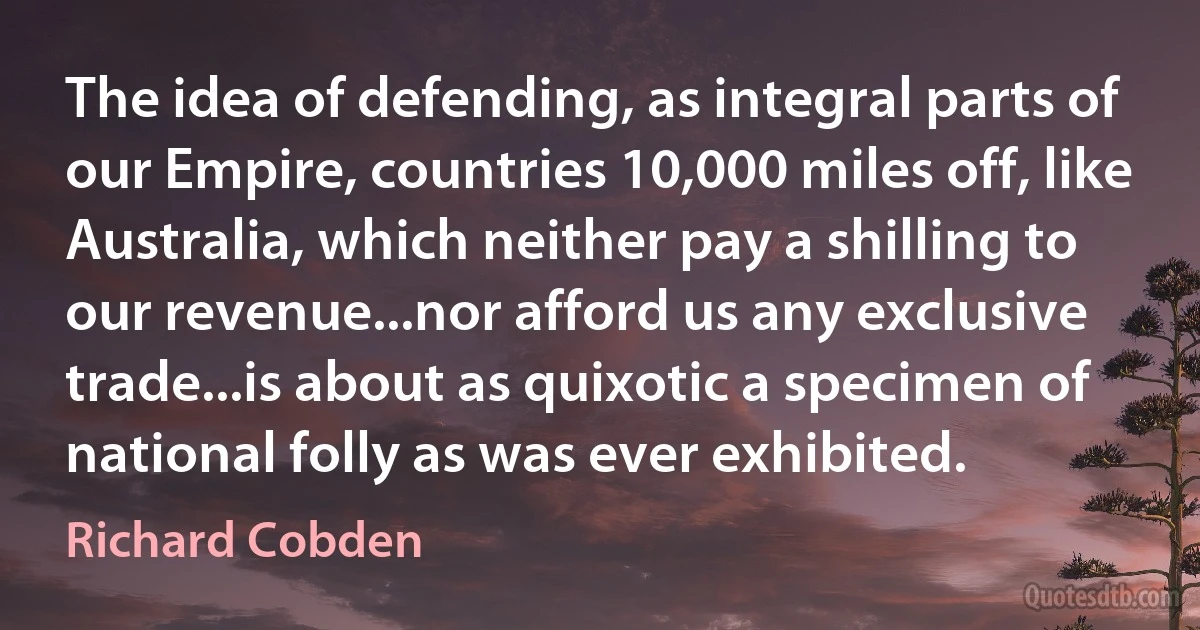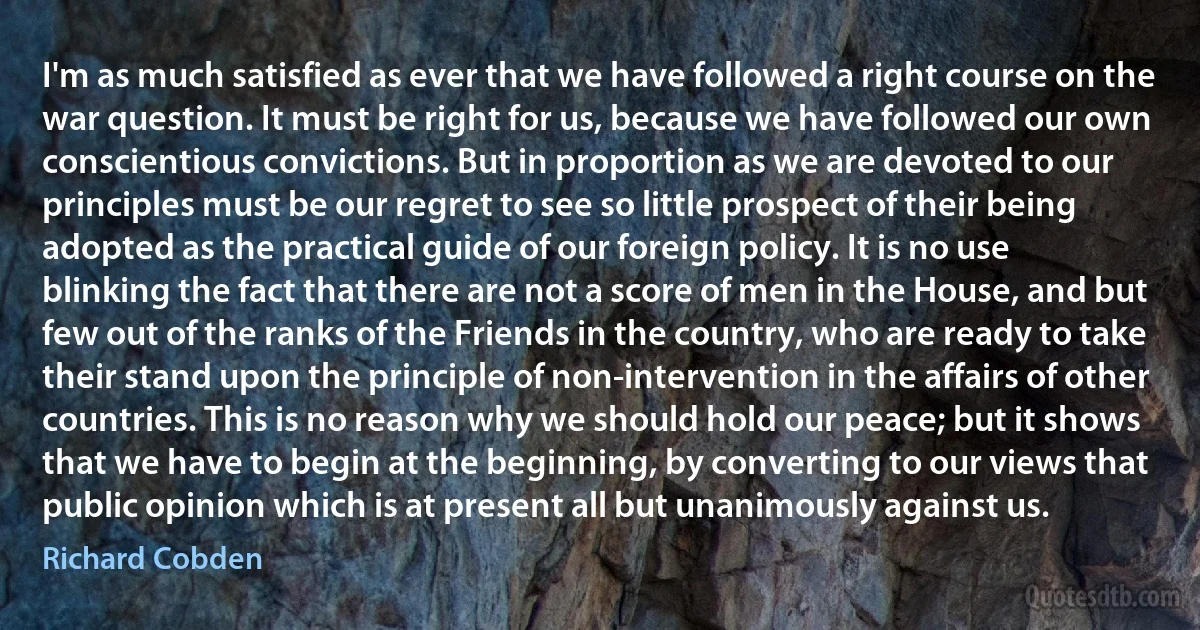Richard Cobden quotes
...the twelve or fifteen millions in the British Empire, who, while they possess no electoral rights, are yet persuaded they are freemen, and who are mystified into the notion that they are not political bondmen, by that great juggle of the ‘English Constitution'-a thing of monopolies, and Church-craft, and sinecures, armorial hocus-pocus, primogeniture, and pageantry!

Richard Cobden
I did not vote upon the Factory question. The fact is the Government are being whipped with a rod of their own pickling. They used the ten hours' cry, and all other cries, to get into power, and now they find themselves unable to lay the devil they raised for the destruction of the Whigs. The trickery of the Government was kept up till the time of Ashley's motion, in the confident expectation that he would be defeated by the Whigs and Free Traders...The Whigs very basely turned round upon their former opinions to spite the Tories. The only good result is that no Government or party will in future like to use the factory question for a cry...One other good effect may be that men like Graham and Peel will see the necessity of taking anchor upon some sound principles, as a refuge from the Socialist doctrines of the fools behind them.

Richard Cobden
When I see a disposition amongst you to trade in humanity, I will not question your motives, I will not deny that it is really felt; but this I tell you, that if you would give force and grace to your professions of humanity, it must not be confined to the negro at the Antipodes, nor to the building of churches, nor the extension of the Church Establishment, nor to occasional visits to factories to talk sentiment over factory children-you must untax the people's bread. Whilst you retain that law, which raises rents but does not raise wages, you may be humane, kind and beneficent, but your benevolence and humanity, more showy than substantial, will soon become a mockery and a bye-word.

Richard Cobden
Well, our forefathers abolished this system [of monopolies]; at a time, too, mark you, when the sign manual of the sovereign had somewhat of a divine sanction and challenged superstitious reverence in the minds of the people. And shall we, the descendants of those men, be found so degenerate, so unworthy of the blood that flows in our veins, so recreant to the very name 'Englishman,' as not to shake off this incubus, laid on as it is by a body of our fellow-citizens? ... We advocate the abolition of the Corn Law because we believe that to be the foster-parent of all other monopolies; and if we destroy that-the parent, the monster monopoly-it will save us the trouble of devouring the rest.

Richard Cobden
With regard to certain other fallacies with which the farmers have been beset, and latterly more so than ever; the farmer has been told that if there was a free trade in corn, wheat would be so cheap, that he would not be able to carry on his farm. He is directed only to look at Dantzic, where corn, he is told, was once selling at 15s. 11d. per quarter, and on this the Essex Protection Society put out their circulars, stating that Dantzic wheat is but 15s. 11d. per quarter, and how would the British farmer contend against this? ...As far as I can obtain information from the books of merchants, the cost of transit from Dantzic, during an average of ten years, may be put down at 10s. 6d. a quarter, including in this, freight, landing, loading, insurance, and other items of every kind. This is the natural protection enjoyed by the farmers of this country.

Richard Cobden
The present condition of the farmers and labourers of this country is the severest condemnation of the Corn-laws that can possibly be produced...let the farmer perfectly understand that his prosperity depends upon that of his customers-that the insane policy of this House has been to ruin his customers, and that acts of Parliament to keep up prices are mere frauds to put rents into the landlords' pockets, and enable him to juggle his tenants.

Richard Cobden
The hon. Gentleman, and other hon. Gentlemen, are pleased to designate me as the arch enemy of the farmers. Sir, I have as good a right as any hon. Gentleman in this House to identify myself with the order of farmers. I am a farmer's son. The hon. Member for Sussex has been speaking to you as the farmer's friend; I am the son of a Sussex farmer; my ancestors were all yeomen of the class who have been suffering under this system; my family suffered under it, and I have, therefore, as good or a better right than any of you to stand up as the farmer's friend, and to represent his wrongs in this House.

Richard Cobden
Has he not accurately anticipated both the fact and the motive of the present attitude of the State of New York? Is it not commercial gain and mercantile ascendancy which prompt their warlike zeal for the Federal Government? At all events, it is a little unreasonable in the New York politicians to require us to treat the South as rebels, in the fact of the opinion of our highest European authority as to the right of secession.

Richard Cobden
No man can defend or palliate such conduct as that of Smith O'Brien and his confederates. It would be a mercy to shut them up in a lunatic asylum. They are not seeking a repeal of the legislative union, but the establishment of the Kings of Munster and Connaught! But the sad side of the picture is in fact that we are doing nothing to satisfy the moderate party in Ireland, nothing which strengthens the hands even of John O'Connell and the priest party, who are opposed to the 'red republicans' of the Dublin clubs. There seems to be a strong impression here that this time there is to be a rebellion in Ireland. But I confess I have ceased to fear or hope anything from that country. Its utter helplessness to do anything for itself is our great difficulty. You can't find three Irishmen who will co-operate together for any rational object.

Richard Cobden
Do not let your zeal for the cause of democracy deceive you as to the fact of the opaque ignorance in which the great bulk of the people of England are wrapt. If you write for the masses politically, and write soundly and honestly, they will not be able at present to appreciate you, and consequently will not support you...There is no remedy for all this but improved education. Such as the tail and the body are, such will be the character of the head. Nature does not produce such monsters as an ignorant or vicious community, and virtuous and wise leaders. In Scotland you are better off because you are better educated. The great body of the English peasants are not a jot advanced in intellect since the days of their Saxon ancestors. I hope you will join us in a cry for schoolmasters as a first step to Radicalism.

Richard Cobden
I agree with you to the letter in all you say about Ireland. There is no doubt that the land question (coupled with the Church Establishment) is at the root of the evil. And here let me say that I go heartily with you in the determination to attack the land monopoly root and branch both here and in Ireland and Scotland.... Wherever the deductions of political economy lead I am prepared to follow. By the way, have you had time to read Bastiat's partly posthumous volume, 'Les Harmonies Economiques'? If not, do so; it will require a studious perusal, but will repay it. He has breathed a soul into the dry bones of political economy, and has vindicated his favourite science from the charge of inhumanity with all the fervour of a religious devotee.

Richard Cobden
The Blockade Laws are about as rascally an invention as the old Corn Laws. Suppose Tom Sayers lived in a street, and on the opposite side lived a shopkeeper with whom he has been in the habit of dealing. Tom quarrels with his shopkeeper and forthwith sends him a challenge to fight, which is accepted. Tom, being a powerful man, sends word to each and every householder in the street that he is going to fight the shopkeeper, and that until he has finished fighting no person in the street must have any dealings with the shopkeeper. "We have nothing to do with your quarrel," say the inhabitants, "and you have no right to stop our dealings with the shopkeeper."

Richard Cobden
Trade has passed out of the hands of British merchants, and into the hands of the Greeks, Swiss, or Germans, all belonging to countries that have no navy to protect them at all. This is the fact; and what is the inference? It may be that English merchants are not educated sufficiently in foreign languages. But it may be also that Englishmen carry with them their haughty and inflexible demeanour into their intercourse with the natives of other countries. The noble Lord [Palmerston] inscribes "Civis Romanus sum" on our passports, which may be a very good thing to guard us in our footsteps. But "Civis Romanus sum" is not a very attractive motto to put over the door of our counting-houses abroad.

Richard Cobden

![If ever there was a hard-headed and not a soft-hearted Sovereign it was she; if ever there was a place where there was little of that romantic sentiment of going abroad to do right and justice to other people, I think it was in that Tudor breast of our 'Good Queen Bess,' as well call her. ... When I see the accounts of what passed when the [Dutch] envoys came to Queen Elizabeth and asked for aid, how she is huckstering for money while they are begging for help to their religion,-I declare that, with all my principles of non-intervention, I am almost ashamed of old Queen Bess. And then there were Burleigh, Walsingham, and the rest, who were, if possible, harder and more difficult to deal with than their mistress. Why, they carried out in its unvarnished selfishness a national British policy; they had no other idea of a policy but a national British policy, and they carried it out with a degree of selfishness amounting to downright avarice. (Richard Cobden)](https://cdn.quotesdtb.com/img/quotes_images_webp/72/richard-cobden-abroad-aid-479172.webp)

